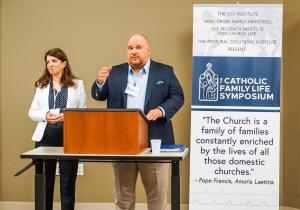
By Dr. Greg and Lisa Popcak
Whatever else God might be doing at this time, it seems clear that he is calling us to discover the power and importance of the Domestic Church. With masses suspended and churches closed, we simply don’t have access to the spiritual resources we normally rely on. We are, quite literally, stuck at home with little choice but to figure out how to encounter God as we shelter-in-place.
Despite the very real limitations we’re all laboring under, God has not abandoned us. His Holy Spirit is still moving powerfully in the world and I believe that it is time to learn how to encounter God more meaningfully in what I like to call “The Liturgy of Domestic Church Life.”
Developed as a result of the Symposium on Catholic Family Life and Spirituality the Liturgy of Domestic Church Life is a model of family spirituality that helps families experience God more meaningfully in their every day circumstances and experience the faith as the source of the warmth in our homes. The following is a kind of FAQ for celebrating the Liturgy of Domestic Church Life in your home. I hope it will help you have a more meaningful encounter with Christ in your everyday life with your loved ones.
What is the “Liturgy of Domestic Church Life?”
“Liturgy” is a word that refers to “work” God does through his church to heal the damage that sin does to our relationship with him and each other. The Liturgy of the Eucharist is the “summit and source” of that healing, uniting us with God and giving us the grace to create communion with others. The Liturgy of Domestic Church Life is the primary way lay people exercise our common priesthood, consecrating the world to Christ by literally bringing Jesus home with us and letting him transform our common families into dynamic domestic churches!
Why Do you Say That Christian Family Life Is A “Liturgy?”
Great question! We have a larger presentation (available on request) that explains the basis of the Liturgy of Domestic Church Life in Church teaching and the Catholic theology of family. That said, check out this link for a brief explanation of the 5 Reasons Family Life is a Liturgy.
How Do You Celebrate the Liturgy of Domestic Church Life?
Every family is different, so every family must feel free to chose specific practices that work for them. But drawing from both the Catholic theology of family and social science research into what makes families in every culture around the world healthy and strong, we suggest that the Liturgy of Domestic Church is made up of three “Rites.” The more your family looks for ways to practice these rites in your unique circumstances the more God’s grace can transform your family into a dynamic domestic church! The three “rites” are…
–The Rite of Relationship: Godly families are called to love each other—not just with the love that comes naturally to us broken, sinful, human beings–but with true, incarnational, Christian love. By challenging each other to live Christ’s sacrificial love in their homes everyday, the Rite of Relationship enables families to exercise the priestly mission of baptism.
-The Rite of Rituals: When godly families make a little time, everyday, to work, play, talk, and pray together, they model how Christians are meant to relate to work, leisure, relationships, and God. In this way, The Rite of Rituals enables famlies to exercise the prophetic mission of baptism, showing each other and the world how Christians are called to live.
-The Rite of Reaching Out: As Christians, we’re mean to be a blessing to others. When Christian families live their family lives with others in mind, being kind, charitable, hospitable, serving others, and working to discern their unique mission and charisms, they exercise the royal mission of baptism by serving with Christ and building the kingdom of God.
What Are Some Examples Of How Families Can Live the Rite Of Relationship?
Catholic familes are called to do more than just live under the same roof and share a data plan! When Catholic families love each other through the priestly mission of their baptism, they practice the sacrifical love that comes from God’s heart. Every family must be free to choose specific practices that let them live this rite in their own circumstances, but here are some examples of things every family can do.
-Extravagant Affection—Christ’s love is incarnational and embodied. The more we share generous, healthy, and appropriate physical affection in our homes, the more our family’s love resembles the incarnate, embodied love of Christ.
-Prompt, Generous, Consistent, Responses to Each Other’s Needs—Psalm 139:4 says, “Even before a word is on my tongue, Lord, you know it all.” God is immeasurably generous to us. Families model God’s love when each member—parents and children—encourage each other to go above and beyond, responding promptly, generously, and consistently to each other needs and concerns.
-Gentle Discipline—Christ is the Good Shepherd. He tends his sheep gently. He leads with love. He is slow to anger. His mercy is neverending. St John Bosco developed a method of discipline he called the “Preventive Method” which rejected heavy-handed punishments in favor of “reason, religion, and lovingkindness.” He argued that a gentle approach to childrearing was more consistent with the call to Christian discipleship because it required parents to develop as well as teach self-mastery. We discuss effective approaches to gentle discipline in our book, Parenting with Grace.
-Prioritize Relationship—Christ encouraged the very busy homemaker, Martha, to “choose the better part” (c.f. Lk 10:42) by making time for intimacy over activity. Godly families follow Christ’s call when we prioritize one-on-one time and, as Pope Francis put it, “waste time with each other,” even when that means opting out of activities that compete with the importance of family time.
-Catch Each Other Being Good—The Christian life is all about growing in virtue. Godly families do well to encourage virtue by “catching each other being good,” acknowledging the little gifts of service and love we give to each other throughout the day, and intentionally discussing opportunities to grow in respect, love, generosity, togetherness, joy, and all the other virtues that help us live life as a gift.
What Are Some Examples Of How Families Can Live the Rite Of Rituals
More than just “nice things to do” regular family rituals give families a way to exerise the prophetic mission of their baptism. Not only do family ritual create a strong sense of community, they give families a way to model the Christian way of life by cultivating goldy attitudes toward work, leisure, relationships, and prayer. Every family must be free to choose specific practices that let them live this rite in their own circumstances, but here are some examples of ways families can Work, Play, Talk, and Pray together everyday
–Work Rituals—When families take a few minutes every day to do simple chores together, like cleaning up the kitchen after meals, folding laundry, picking up the family room, and other household tasks, they model teamwork, stewardship, and cheerful service.
-Play Rituals—When godly familes make a point of taking a few minutes everyday to do things like play simple board games or card games, play catch, bake together, do a project, have read-aloud time, take a walk, or enjoy each other’s company in any other way, they model healthy, godly ways to have fun.
-Talk Rituals—When familes take a few minutes of every day—perhaps over their regular family meal(s)–to discuss topics like the highs and lows of the day, the little ways God has blessed them, and how they might do a better job taking care of each other, they create experiences of heart-to-heart communion in the home.
-Pray Rituals—Simple practices like morning and bedtime prayer, grace-at-meals, blessing each other, a family rosary or chaplet, family praise and worship times, bible reading, and other accessible, age-appropriate spiritual practices help families invite God into their homes and relate to him as the most important member of their family! The one who knows them best and loves them most.
What Are Some Examples Of How Families Can Live the Rite Of Reaching Out?
When families love each other and their “neighbors” through the royal mission of their baptism, they cultivate a spirit of loving service in their hearts. Although its important to find ways to serve your parish or community together as a family, true Christian service begins at home. Every family must be free to choose specific practices that let them live this rite in their own circumstances, but here are some examples of ways families can practive the Rite of Reaching Out.
–Serve Generously At Home—A true heart of service begins with serving the people closest to us. Look for ways to make each member of the family’s days easier and more pleasant.
–Think of Others While At Home—Remember to take care of clothes, toys, and other things you have so that you can pass them on to others who may need them in your community. When you’re cooking, make a little extra for the sick, pregnant, or elderly neighbor. Consider the ways you can be a blessing to others without even having to leave home.
–Be Hospitable—Make your home a welcoming place for others. Regularly invite people to share meals and enjoy opportunities for good, clean fun and even prayer together. Be the house on the block where the neighborhood kids like to gather. Host a neighborhood BBQ.
-Be Kind in the World—When you go out as a family, make a point of being kind and respectful to customer service people, waitstaff, and others. Practice good manners. Be thoughtful. Say, “please,” “thank you” and “excuse me.” Hold the door for others. Be aware of the people around you and how you can model kindness in the simplest interactions.
-Serve Together— Don’t let your parish life or charity work be one more thing that pulls your family apart. Look for age-appropriate ways to serve your parish or community together as a family.
-Discover Your Family Mission and Charism—By prayerfully discerning the virtues God is asking your family to exemplify and how to use the gifts, talents, or interests your family shares to bless others, you discover the unique role your family plays in building the Kingdom of God!
~ ~ ~
Imagine what a difference Catholic families could make if we all did our best to live the Liturgy of Domestic Church Life. Though simple acts like these, every family could cooperate with God’s grace to transform their homes into loving, sacred spaces and consecrate the world to Christ!
If you’d like to discover more about how the Liturgy of Domestic Church Life can bless your family, I hope you’ll join our Facebook discussion group,
or check out my book Discovering God Together: The Catholic Guide To Raising Faithful Kids.
_________________
Dr. Greg and Lisa Popcak are the authors of many books, the hosts of More2Life Radio, and the directors of CatholicCounselors.com, a Catholic tele-counseling service of the Pastoral Solutions Institute.










